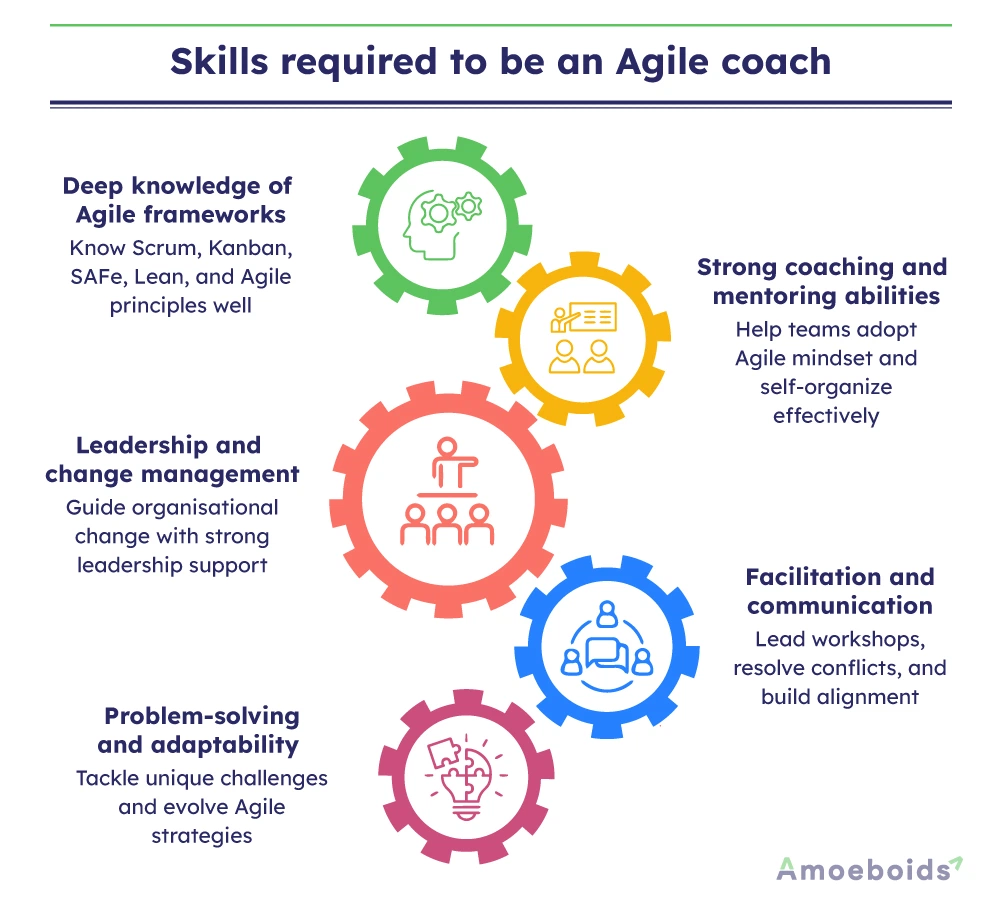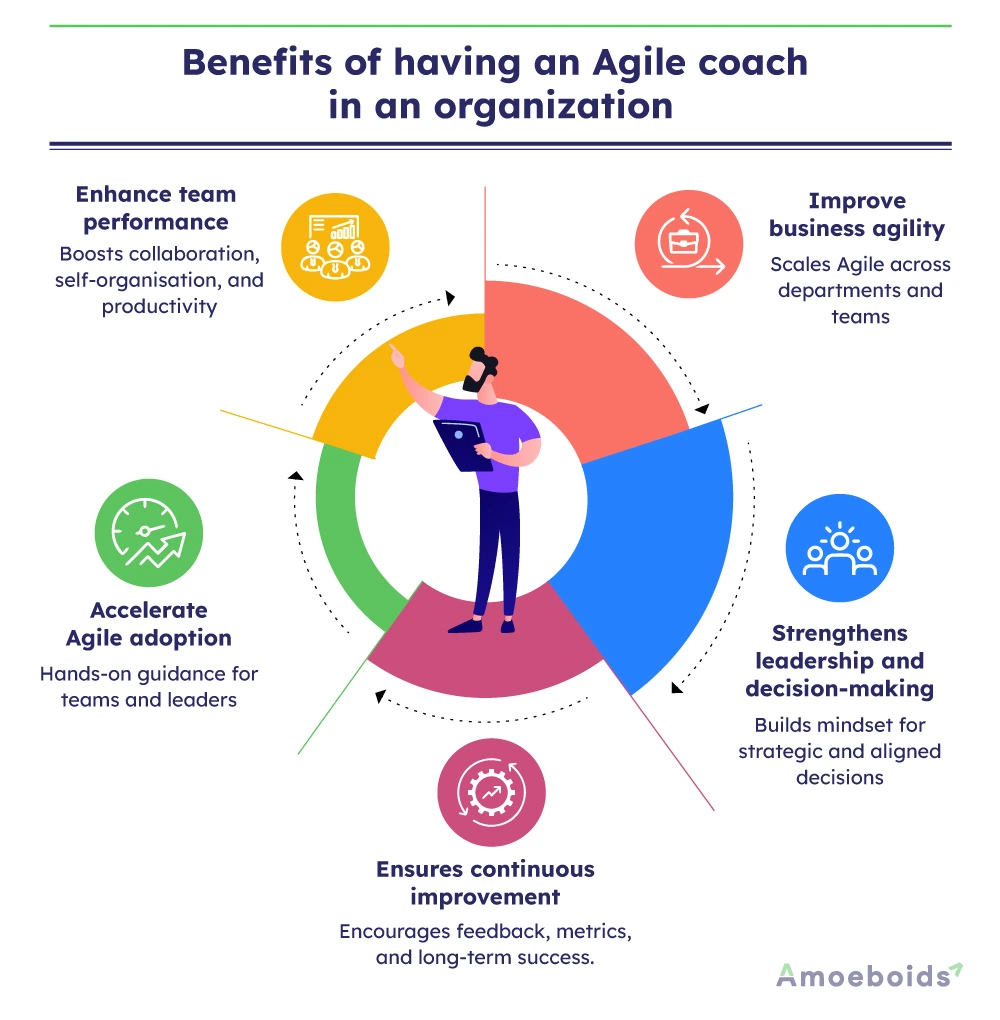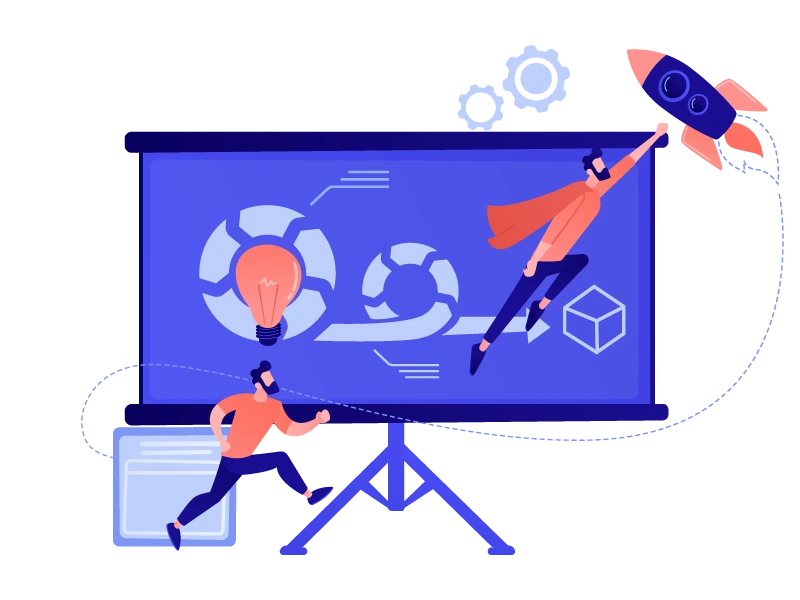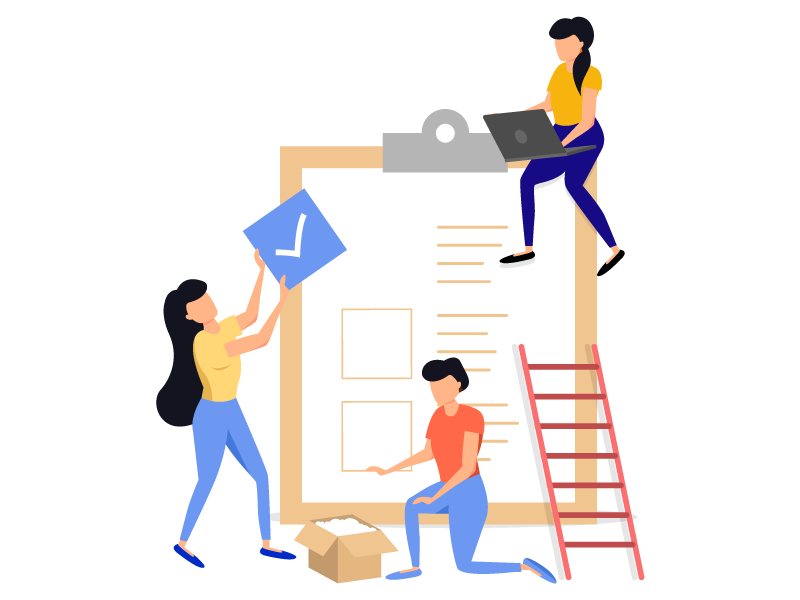Many organizations face a common challenge: slow decision-making, rigid processes, and structures that no longer serve a fast-changing world. These barriers don’t just hinder progress — they stifle innovation, frustrate teams, and delay outcomes.
An Agile coach helps organizations navigate and overcome these challenges by introducing ways of working that promote adaptability, collaboration, and continuous improvement. Whether you’re at the beginning of your Agile journey or looking to scale it across teams, a coach plays a critical role in embedding lasting change, not just in practices, but in mindset and culture.
In this article, we’ll explore what an Agile coach does, the unique value they bring, and how they help organizations build resilience and responsiveness at every level..
Who is an Agile coach?
An agile coach ensures businesses can successfully implement and sustain Agile frameworks like Scrum, Kanban and SAFe. By coaching Agile teams, they help improve workflows, encourage iterative development, and ensure continuous improvement.
Some Agile Coaches also specialize as enterprise Agile coaches, working with senior leadership to drive large-scale Agile adoption and cultural change. They serve as facilitators, guiding businesses through Agile transformations to enhance efficiency, collaboration and adaptability.
Roles and responsibilities of an Agile coach
The role of an Agile coach shifts depending on your organization’s maturity, team dynamics, and business goals. Whether they’re guiding a few teams or leading a company-wide transformation, an Agile coach has varying roles and responsibilities, and each one is focused on helping your people and processes work better together.
Here’s how an Agile coach makes a difference:
- Agile training and mentorship – An Agile coach is both a teacher and a mentor. They run workshops, one-on-one coaching sessions, and leadership training to help teams, Scrum Masters, Product Owners and executives.
For example, they might guide a team through Scrum ceremonies for the first time or help leadership understand why iterative development beats rigid long-term planning.
- Facilitating Agile transformation – Adopting Agile isn’t an instant change; it’s a shift in mindset and operations. An Agile coach guides this journey, helping choose the right framework (Scrum, Kanban, SAFe), tailoring it to fit the organization, and supporting teams through the early challenges, like moving from detailed upfront plans to faster, flexible sprints.
- Optimizing Agile processes and collaboration – After the teams adopt Agile, the real work begins. An Agile coach identifies bottlenecks, miscommunications, and inefficiencies and helps streamline collaboration to keep work flowing smoothly.
- Driving cultural and mindset shifts – Agile isn’t just a process, it’s a mindset. Agile coaches build a culture of adaptability, customer focus, and continuous learning, often encouraging teams to experiment early rather than chase the illusion of a perfect plan.
- Problem-solving and continuous improvement – Every Agile journey has challenges, from team burnout to stakeholder resistance. An Agile coach steps in as a problem-solver, helping teams overcome obstacles, build resilience, and continuously improve through honest reflection and better retrospectives.
- Ensuring long-term Agile sustainability – Agile transformation should be a lasting change. This is why agile coaches need to focus on building self-sufficient teams by developing internal coaches, creating knowledge-sharing hubs, and establishing practices that endure long after they’re gone.
Rego Consulting’s coaches help businesses with Agile practices
Rego Consulting’s Agile coaches help large enterprises train teams in Agile principles, run workshops and mentor leaders to embrace iterative development and collective ownership. They have developed their business model to deliver results in project and portfolio management (PPM), work management and Agile transformation.
The firm identified the demand for extensive training, facilitating Agile transformations and optimizing processes and collaboration and developed the skillset and knowledge base necessary to provide relevant services as efficiently as possible, keeping Agile principles in mind. This was highlighted when they included training modules for cloud optimization and support in the middle of a training cycle.
Skills required to be an Agile coach
An Agile coach needs a diverse skill set that combines expertise, leadership abilities and strong communication skills. Given that their role involves guiding teams, training leadership and driving Agile transformation across an organization, here are some skills an Agile coach should possess:

- Deep knowledge of Agile frameworks: It goes without saying that a successful Agile Coach must be proficient in Agile methodologies like Scrum, Kanban, SAFe and Lean. They should understand Agile values and principles to effectively coach teams and leadership.
- Strong coaching and mentoring abilities: Coaching and training is at the core of this role. An Agile coach must have expertise in mentoring teams and individuals, helping them embrace Agile mindsets and self-organizing practices.
- Leadership and change management: Driving agile transformation requires strong leadership skills. Enterprise Agile coaches must work closely with executives, managers and stakeholders to embed the system at an organizational level.
- Facilitation and communication: Agile coaches must be excellent facilitators, capable of leading training sessions, workshops and ceremonies. Strong communication skills help them align teams, resolve conflicts and ensure smooth Agile adoption.
- Problem-solving and adaptability: Each organization faces unique challenges during Agile adoption. Agile coaches must be skilled in problem-solving, creating and adapting strategies to different business environments and continuously improving Agile processes.
These skills enable an Agile Coach to drive meaningful agile transformation and ensure Agile principles are effectively implemented across teams and organizations.
Benefits of having an Agile coach in an organization
An Agile coach helps transform organizations by fostering adoption, improving collaboration and driving efficiency. Their expertise helps businesses navigate the challenges of Agile implementation and achieve sustainable growth. Having an agile master helps:

- Accelerate Agile adoption: An agile coach provides hands-on guidance, helping teams and leadership embrace Agile principles effectively.
- Enhance team performance: An Agile Coach improves team collaboration, self-organization and productivity, eliminating roadblocks and creating high-performing Agile teams.
- Improve business agility: With an enterprise Agile coach, organizations can scale practices across multiple teams and departments. This enhances adaptability, enabling businesses to respond faster to market changes and customer needs.
- Strengthens leadership and decision-making: Agile coaches focus on fostering the mindset necessary to adopt the method at the leadership level. This results in better strategic decisions and improved alignment with business goals.
- Ensures continuous improvement: Through Agile best practices, performance metrics and feedback loops, an Agile coach helps organizations sustain long-term success, ensuring ongoing innovation and efficiency.
Having an Agile coach helps improve adaptability, collaboration and continuous improvement in the process, ensuring long-term success in a rapidly evolving business landscape.
How to become an Agile coach?
Becoming an Agile master requires a combination of experience, coaching skills and continuous learning. The journey involves gaining expertise, certifications and practical experience. Here is a structured step-by-step roadmap to help you transition into this role:
- Develop Essential Skills
- Deep understanding of Scrum, Kanban, SAFe, LeSS, DevOps and Lean principles.
- Effective communication skills to mentor teams, conduct Agile ceremonies, foster collaboration and the ability to influence without authority.
- Identify bottlenecks, remove impediments and enhance team performance.
- Get Certified in Agile Coaching and Leadership: Certifications boost credibility and help you gain specialized coaching knowledge. You can consider these certifications:
- Beginner Certifications (Agile Fundamentals)
- Certified Scrum Master (CSM) – Scrum Alliance
- Professional Scrum Master (PSM) – Scrum.org
- SAFe Agilist (SA) – Scaled Agile
- Advanced Agile Coaching Certifications
- ICP-ACC (ICAgile Certified Professional – Agile Coaching) – Covers coaching mindset and techniques.
- ICP-ATF (Agile Team Facilitation) – Focuses on facilitation skills.
- Certified Enterprise Agile Coach (ICP-CAT) – Specializes in large-scale Agile transformations.
- Leadership and Change Management Certifications
- SAFe Program Consultant (SPC) – For enterprise Agile implementation.
- Lean Change Agent Certification – Helps in organizational Agile adoption.
- ORSC (Organizational Relationship Systems Coaching) – Leadership and team coaching.
| Tip: Start with Scrum Master certifications, gain experience and then pursue coaching-focused certifications. |
- Gain hands-on Agile experience: Before transitioning into an Agile coach role, it’s important to work in various environments where the method is in use already. Start by taking up roles that build Agile expertise, such as:
- Scrum Master – Facilitates Agile processes and helps teams improve.
- Product Owner – Manages the product backlog and collaborates with stakeholders.
- Agile Project Manager – Leads Agile adoption within organizations.
- Agile Team Lead – Guides teams in Agile methodologies and continuous improvement.
- Build Coaching experience: Here are a few ways in which you can gain agile coaching experience:
- Work with teams in your organization to implement Agile practices.
- Volunteer for Agile transformation initiatives
- Join Agile communities, participate in meetups, conferences and online forums.
- Share Agile insights through blogs, webinars and case studies.
- Transition into an Agile coach role: Once you have certifications, experience and coaching skills, you can move into formal Agile coaching roles. Therefore, your career path will include the following roles:
- Internal Agile coach – Works within a company to train teams and drive Agile transformation.
- External Agile consultant – Coaches multiple organizations on Agile adoption.
- Independent Agile trainer – Provides Agile coaching services as a freelancer.
Conclusion
An Agile coach drives meaningful transformation by helping organizations adopt Agile principles, improve processes, and create lasting change. They work with teams and leaders to build a culture of continuous improvement, collaboration, and adaptability, which strengthens the overall foundation of the business. Aspiring Agile coaches should focus on gaining hands-on experience, earning relevant certifications, and developing practical coaching skills to become effective change agents.
On the other hand, organizations should invest in Agile coaching to help them thrive in an increasingly fast-paced and competitive environment. By investing in Agile coaching, organizations can accelerate their transformation, optimize processes and create a sustainable path to long-term success.
FAQs
How does an Agile coach differ from a Scrum Master?
An Agile Coach operates at various levels – team, program, and enterprise- driving Agile transformation across teams and leadership, while a Scrum Master primarily focuses on guiding a single team in Agile practices and Scrum frameworks.
What certifications are required to become an Agile coach?
Key certifications for an Agile Coach include ICP-ACC (Agile Coaching), ICP-ATF (Team Facilitation), SAFe SPC, Certified Scrum Master (CSM/PSM), and Certified Enterprise Agile Coach (ICP-CAT) for advanced transformation expertise.
How does an Agile coach assist in enterprise Agile adoption?
An Agile Coach drives enterprise Agile adoption by guiding and training leadership, customizing frameworks (SAFe, LeSS), fostering cultural change, improving cross-team collaboration, and ensuring sustainable Agile transformation across departments and business units.
What industries benefit the most from hiring an Agile coach?
Industries with complex workflows and rapid market changes- such as technology, finance, healthcare, manufacturing, and telecom – benefit most from Agile coaches. They help enhance adaptability, streamline processes, and foster innovation in highly competitive environments.

